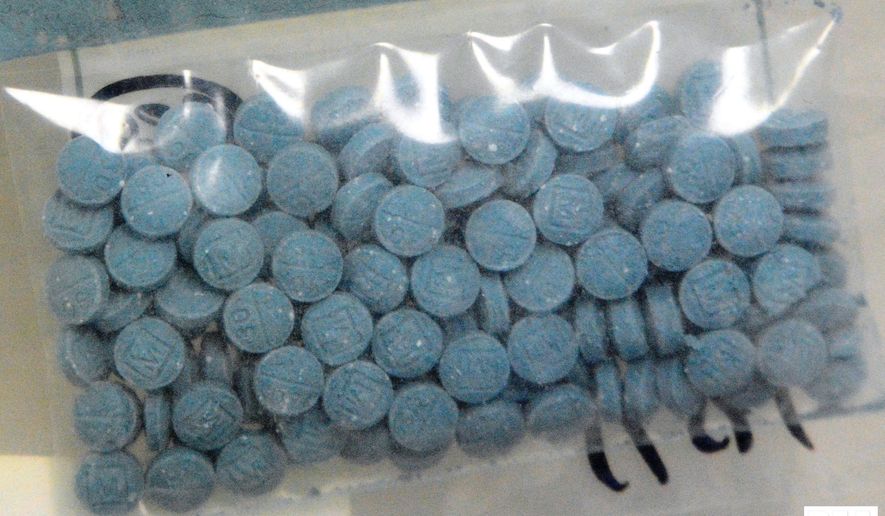The Justice Department opened several new fronts Wednesday in the battle against opioid addiction, announcing legal action against Chinese manufacturers that ship drugs into the U.S., “dark net” operators who sell them to users, and doctors who overprescribe painkillers to their patients.
Two Ohio doctors were served with temporary restraining orders banning them from writing any prescriptions after the government accused them of being “automatic prescription machines,” doling out drugs for the asking.
Meanwhile, two Chinese men were charged with running a massive operation that manufactured and shipped deadly synthetic opioids into the U.S., leading to the deaths of at least two Ohio men.
And the government announced new legal action against Americans selling opioids through the dark corners of the internet, hoping to cut into the supply of drugs fueling the epidemic.
Attorney General Jeff Sessions, who announced the moves in Cleveland, said they’re evidence the government is adapting to the unique challenges of the opioid scourge.
“Today’s announcements are a warning to every trafficker, every crooked doctor or pharmacist, and every drug company, every chairman and foreign national and company that puts greed before the lives and health of the American people: This Justice Department will use civil and criminal penalties alike and we will find you, put you in jail, or make you pay,” Mr. Sessions said.
Prosecutions of manufacturers and distributors of illicit drugs are fairly common — though the bust of internet sellers Mr. Sessions announced as part of Operation Darkness Falls snared one of the “most prolific” vendors on the dark web.
But Mr. Sessions said using temporary restraining orders to stop doctors from being able to prescribe is a pioneering tactic, giving the government a chance to block suppliers before they’re found guilty in court.
The two Ohio men the federal government targeted were Dr. Gregory J. Gerber of Sandusky and Michael P. Tricaso of Akron.
In the case of Dr. Gerber, patients from nearly 100 miles away flocked to him, in what investigators said was a clear “red flag” that something was fishy about the operation.
He also wrote prescriptions for more than 13,000 doses of oxycodone for his in-laws — another red flag, investigators said. All of those prescriptions were filled at the same pharmacy, where his wife worked.
The Drug Enforcement Administration used undercover informants to make illicit buys from Dr. Tricaso, and in a court affidavit an investigator said he admitted he would “lie” on prescription charts to justify the shipment from an out-of-state pharmacy.
“These doctors were simply drug dealers in white lab coats,” said U.S. Attorney Justin Herdman, who joined Mr. Sessions in announcing the actions Wednesday.
Though criminal prosecutions are just beginning, judges in both cases agreed with the government that the behavior was suspicious and issued the temporary restraining orders prohibiting the men from writing any prescriptions.
Neither man replied to messages seeking comment left at their offices Wednesday.
Policymakers in Washington and in statehouses across the country are reaching for ideas that could make a dent in the opioid scourge, which claims tens of thousands of lives each year. More than 49,000 people died last year from overdoses of opioids, including prescription painkillers, heroin and the powerful synthetic fentanyl, according to the Centers for Disease Control and Prevention.
Breaking the cycle of addiction has proved difficult, while the advent of powerful new synthetic opioids such as fentanyl and carfentanil has increased the danger to users. Officials at the national and state levels have allocated billions of dollars to combat addiction, but breaking the supply chain has been more of a challenge as the bodies pile up.
Two of those bodies — overdose victims in Akron — led to Chinese suppliers, the Justice Department says. Prosecutors unsealed a 43-count indictment against Fuing Zheng and Guanghua Zheng, both of Shanghai, on charges of conspiracy to manufacture controlled substances, to import them into the U.S., and to launder money from the enterprise.
The government also announced new legal victories from Operation Darkness Falls, a federal effort to go after people illicitly selling fentanyl over the internet.
The operators of MH4Life were using dark net marketplaces such as Silk Road, AlphaBey and Dream Market to sell opioids, the government charges. They made thousands of sales over seven years, prosecutors said.
• Stephen Dinan can be reached at sdinan@washingtontimes.com.




Please read our comment policy before commenting.